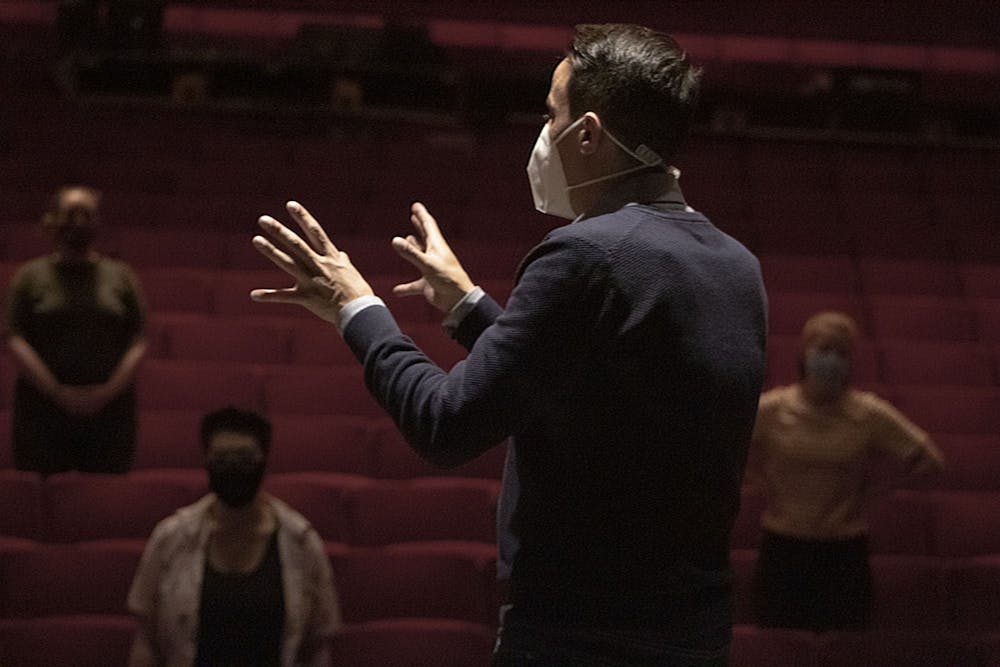The Jacobs School of Music Opera and Ballet Theater will present “La Bohème” on April 23 and 24 at 7:30 p.m. The Italian opera will be streamed live with English subtitles, according to the event’s website.
Written by Giacomo Puccini, “La Bohème” follows the lives of four struggling artists, or “bohemians,” living together in 19th-century Paris, according to director and professor Michael Shell. One Christmas Eve, a girl named Mimi knocks on their door. She and one of the four bohemians, Rodolfo, fall in love.
“They try to find their way through this, but are soon sharply awakened to the harsh realities of life and immortality,” Shell said. “They come to terms with the fact that they’re not going to live forever.”
The opera is based on a novel by Henri Murger, “Scenes de la vie de Bohème.” IU’s production, however, will contain a twist, Shell said. By adding a few scenes where Rodolfo writes what will become Murger’s novel, Shell has transformed the opera into a “memory play,” making the original plot into a flashback.
This change shows Rodolfo shifting back and forth from an active member of the story to a passive observer, writing the story two years later, Shell said. Graduate student Brendan Boyle, one of two performers playing Rodolfo, plays these two roles as separate characters.
“You’re going from the Rodolfo two years later who’s remembering all this and writing it down, and then the Rodolfo who was living in that moment and interacting with those people at the time,” Boyle said. “I think there has to be something that’s different about him when all of this was going on.”
Graduate student Sam Mathis, the singer playing Rodolfo in the other cast, said for him, this shift highlights both the clarity and the pain the character receives from reliving the events of the opera.
“It’s reliving the memory of love that he shared with his friends and with Mimi,” Mathis said. “And it’s hard, but I think it adds a really cool layer of getting to experience it in real time, but also being able to step away and collect those thoughts and write them down.”
The use of a memory play has also allowed Shell to work social distance into the story itself, he said. While "La Bohème" isn’t an excessively physical opera, there are typically moments of physical intimacy. Now, though, they have to stay at least ten feet apart.
“It affects the staging hugely, the process of trying to arrange everybody to keep them far enough apart,” Boyle said. “Normally in these scenes, you’d have everybody crammed around a table, and you’d have Mimi and Rodolfo kissing and right next to each other the entire time. So it’s definitely been a different process.”
The use of flashbacks makes the performers’ interactions theatrical rather than realistic, Shell said. This ensures that the intentions that the singers are portraying come across while keeping them far enough apart to ensure safe distancing.
While this may present a new challenge for the performers, it’s one they’re willing to take on, Mathis said.
“It really works once people buy in, and it starts to feel natural after a while,” Mathis said. “It’s really difficult, but it’s a lot of fun, and it almost adds another element to the show.”
Shell said he agrees. He hopes that, while it may be difficult to work with in the moment, navigating the stage with social distancing restrictions and masks will help them grow and become better performers.
“The performance on the MAC stage is in many ways an extension of the classroom, or the studio,” Shell said. “So while it’s been challenging, it’s also been a bit of a silver lining in regards to me teaching them about acting.”
Information on where to watch the performance can be found on the event’s website.




